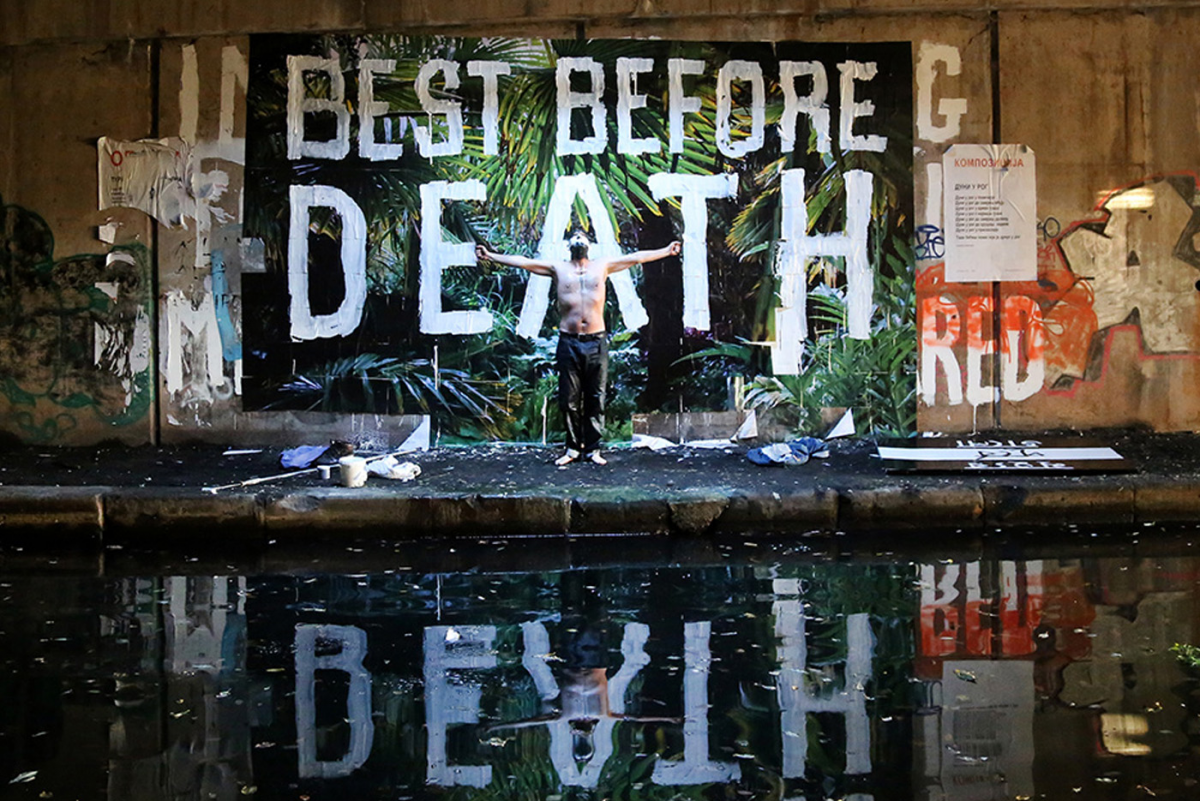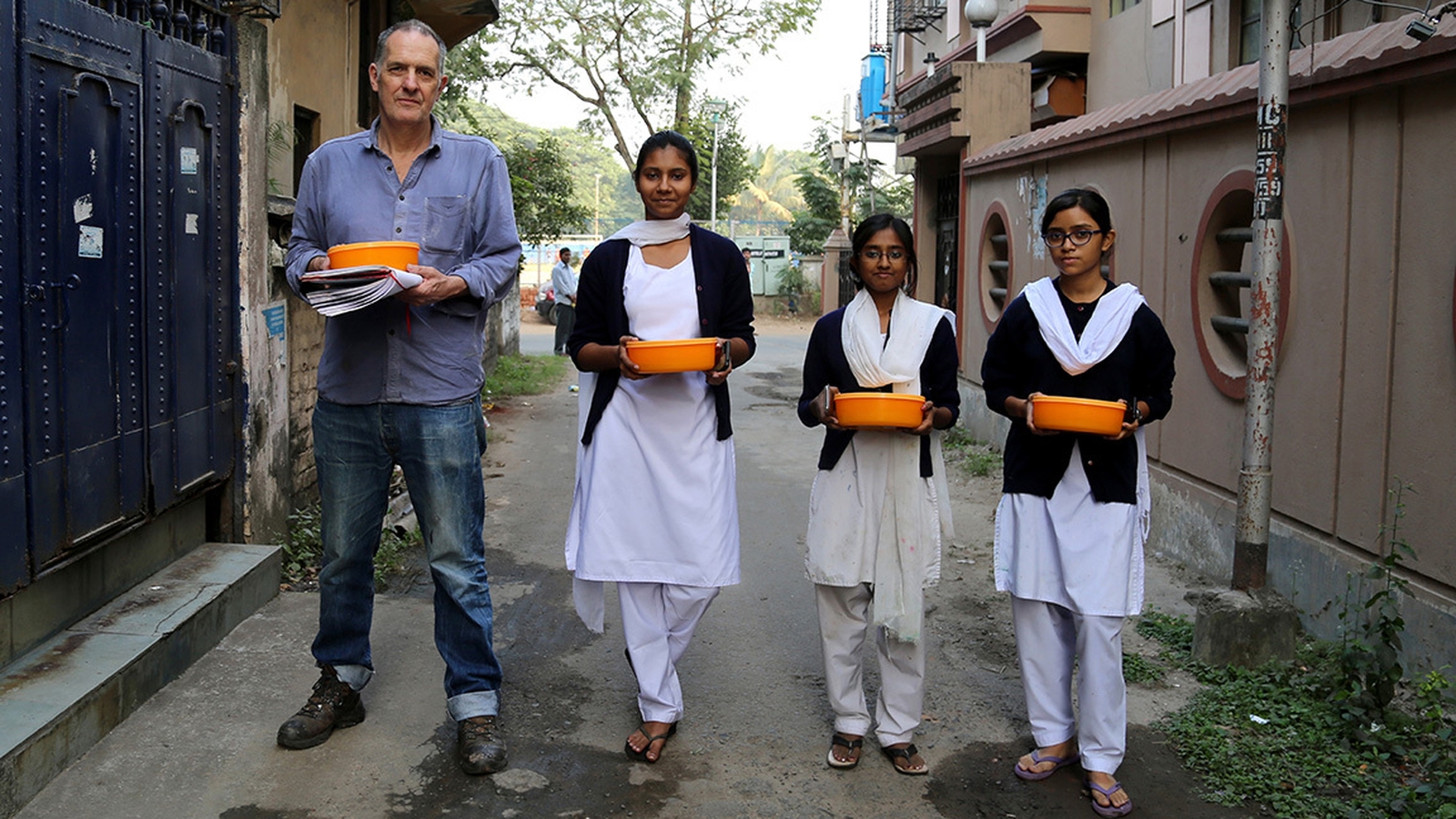The Great World Bake – Off with Bill Drummond

Bill Drummond. Everyone’s got a story about Bill Drummond.
Even people who haven’t met him have got a favourite Bill Drummond story. The conceptual artist and some-time pop star, whose whole life appears to have been a grand project, has become as noted for his situationist tactics, most notably with the KLF, as anything else.
From writing a manual on how to have a number one single and achieving the said task with his Timelords. To that one that everyone knows about by way of machine guns and throwing a dead sheep at the feet of the record industry at the Brits. This all in between having a hand in rave shenanigans and inventing chill out and ambient house, his CV is packed. Even his management outing, he notably represented Echo and the Bunnymen, plays out like some performance art piece – not least his insistence they toured in weird places – it was less about business and more about art.
Director Paul Duane, whose Best Before Death documentary is now out on Blu-ray and digital, has his own one too. It involves Van Morrison, in his pre-anti-mask conspiracy theorist days. The troubadour sent over a bottle of champagne to Drummond after spotting him in a members’ bar in Dublin.
“Bill looked over and there’s Van Morrison waving at him. He said:
‘How does Van Morrison even know who I am?’
He went over out of politeness. Van just shouted:
‘You’re that fella that left the music business. How did you do it?’
Bill told him he just left.
‘I keep trying, but they won’t let me,’ Morrison replied.
Bill told me an awful lot of stories. He’s full of some of the funniest anecdotes. It gets Bill’s sense of humour.”

It’s easy to brand Drummond as the bloke who burned a million quid (no feature on him will ever not mention it, no journalist would never not ask him if he really did it).
However, Best Before Death shows that he’s much more than that. Paul Duane’s wonderful film – a genuinely feelgood affair – follows Drummond on his world tour. It sees Drummond visiting specific cities and countries, originally intended to take place over 14 years, visiting 14 different countries, exhibiting in each and performing a set series of tasks. The film follows him launching the event, somewhere underneath the Spaghetti Junction in Birmingham, then on to two locations, Kolkata, India and Lexington, Kentucky. Rather than a straightforward documentary, hagiography, a blow-by-blow life story, it sees Drummond searching for art in the often mundane, baking cakes, crafting beds and talking to people about art.
The film was a lengthy project – a long passage of time between the filming of the different events, with more than a year year between each arrival at a new city, plenty of preparation as the budget came together and then the editing. The whole thing took, as Duane notes, “about five or six years, it was a long process”.
Duane began working with Drummond after emailing him out of the blue.
“I’d just finished making three documentaries, each of which had very difficult draining subject matters, mental health issues, substance abuse, fairly tough stuff. I wanted to choose something positive, I tried to think of who I admire.”
Chancing upon one of Drummond’s tomes in a bookshop, he was enthralled and the lightbulb appeared.
“It hadn’t struck me to think of him,” Duane recalls “but everything he writes about creativity, about art, about life, really left me inspired. His email was pretty easy to find. I fired off a quick email, saying ‘I don’t know what you’re doing or planning, but I’d love to work together’.”
Duane offered links to his other films and before long the pair were discussing Drummond’s world tour project. As he insisted and told Drummond: “I was not looking to make a film about the KLF or burning the money.”
Logistics worked out – at one point the tour was scheduled for Memphis, before ending up instead in Lexington, where Drummond had spent some time as a child with his minister father and family on an exchange – they embarked on the ambitious project.
The whole KLF and burning of a million pounds nary warrants a mention – his hosts in Kolkata look Drummond up on Wikipedia and he replies off-handedly and modestly to their probing.
“To be honest, I would have been happy if people had asked him more about it,” Duane laughs now.
“With the best will in the world, it’s a big part of Bill’s history. His response to people asking was always interesting to me. We kind to tried to get people to talk about it without telling them.”
One of the Blu-ray extras sees Drummond going to the house in Lexington where he lived as a child on his dad’s exchange programme. Sadly, Drummond wasn’t there when the family now living in the home’s teenage son ran down the stairs shouting “mum, dad, he burned a million dollars!”
As Duane adds: “It’s Interesting to see how people respond. There’s this very grandfatherly modest figure and he’s behind these controversial, extraordinary unrepeatable acts. But it didn’t really come up, so what are you going to do?”
Instead of of further ruminating on that – although it must be noted, the moment when Drummond mentions that the act of deleting the entire KLF catalogue was rendered somewhat less meaningful when YouTube came along – we get Drummond talking about pretty much everything else, all the time carrying out the same acts he was planning to repeat in every destination on his lengthy world tour.
At each city he goes into a river, or canal, wearing a new pair of jeans, giving the shrink to fit Levi’s treatment in local water. As he explains, he wears a pair of jeans a year, having bought enough pairs to last him the rest of his life. It’s this mixture of the trivial elements of Drummond’s life and ideas, mixed with the other parts of the project, that make this such a life-affirming film. In each city he embarks on various elements – baking a cake, making a bed, literally, from wood acquired locally, and gifting it – as well as cakes – to locals. He shines shoes, something that takes on more poignancy in Lexington where he offers the service free on the steps where slaves were once traded. Each of these is signposted and Drummond will take the time to explain to often bemused and bewildered locals, what he’s doing. The art, he insists, is not in the making of the bed, say, but in what happens to the bed afterwards, who sleeps in it, what they dream and beyond.
“We thought if not one city, why not do two?” Duane says.
“It was about the notion of him doing the same thing in the two locations, comparing the way those two worked. Bill set the agenda. He was going to do these things anyway, the intention was not to manipulate it. Bill wasn’t working for me. We were there to capture it, although our presence does change things.”

Spread out over time – there was an even further paise between the two main locations as the KLF shenanigans in Liverpool interrupted the world tour – the film came together during the edit. The fact there was no conventional documentary or feature narrative might have proved daunting but, as Duane notes:
“Myself and my editor Tom Cranstoun, who is equally as responsible as anybody, figured out the structure looking at the material. The challenge was how to figure out the structure, but the edit was a pleasure. The difficult part was deciding how much hand-holding to provide for the audience. We didn’t want a voiceover, although we used a little bit of text on the screen.”
Duane didn’t want to spend the film over-explaining what Drummond was doing, nor over-simplify it.
“We showed the film to different people and we were getting vastly different responses – from complete incomprehension to very positive responses.”
After much conversation about whether or not to bring a wider audience in, to make it more understandable, Duane eventually decided not to.
“My feeling was just the people who like it love it. Others won’t get it. In the US, we’re not going to bring in Trump voters by watering it down. Certain people are not going to get it. It isn’t for the biggest audience possible, it’s for the people who get this. It might seem pompous, but it’s not going to reach a mass audience.”
It’s a brave move, but you can’t help getting the feeling that the film is all the better for it. Drummond himself, who doesn’t come across as a fan of fly on the wall shooting, is happy.
“Bill likes the film which is interesting to me – he has a very, very dim view of documentaries. He thinks documenting it is watering it down.”
Does Duane think it works?
“I think in a way it succeeded, I think it gets across the complications and complexities and different aspects of his character in a way that isn’t simplistic or dumbed down. To some degree, it replicates the experience of meeting with him. It’s a ombination of things that might comfort or confuse people and things that inspire you.”
Of course, it’s not just a wacky thing about some bloke being wacky.
“It would be very easy to portray him as some sort of eccentric, but calling somebody eccentric is putting them into a box, don’t have to think about what they are doing. He has an approach to his life that involves a very careful thought out understanding of what art is. He’s trying to figure out what art is and what his art should be. His life has become a constant attempt to make art of whatever is around him. He’s constantly in a state of flux. It’s interesting for a man in his 60s, he’s so open to change, so open to discovering he’s wrong, so open to being debated. He’s made a conscious decision to stay open to new things. The world tour was a way of forcing change upon himself.”
That change has continued since the film was completed, not least due to circumstances, what, with that global pandemic thing.
As Duane concludes:
“He’s now limited his activities to the the island of Great Britain, working with migrant communities, in different areas such as Great Yarmouth, with communities that have transplanted themselves. He came to feel that all this travelling was a macho exercise that wasn’t positive in terms of his carbon footprint, he’s consistently changing what he’s doing.”
Best Before Death, complete with a marvellous commentary from Duane and Drummond (the latter of whom has never heard a Blu-ray or DVD commentary) is now available on Blu-ray from Anti-Worlds.

















Must Reads
David Holmes – Humanity As An Act Of Resistance in three chapters
As a nation, the Irish have always had a profound relationship with the people of Palestine
Rotterdam – A City which Bounces Back
The Dutch city is in a state of constant revival
Going Remote.
Home swapping as a lifestyle choice
Trending track
Vels d’Èter
Glass Isle
Shop NowDreaming
Timothy Clerkin
Shop Now